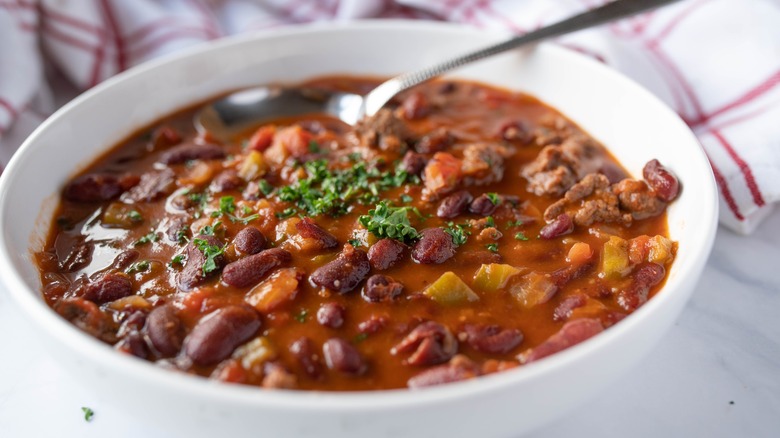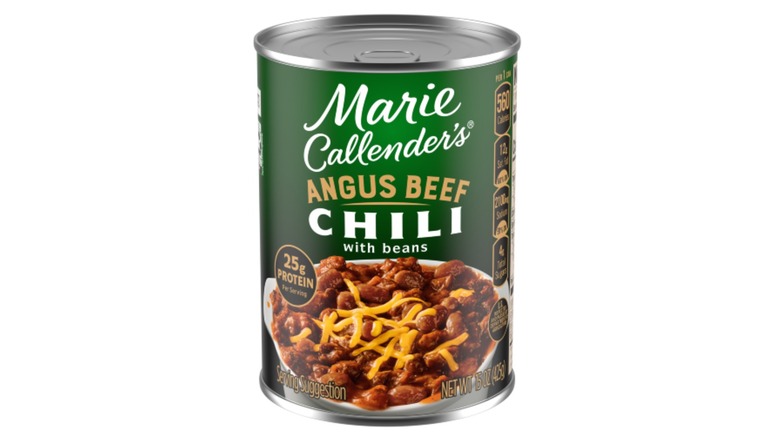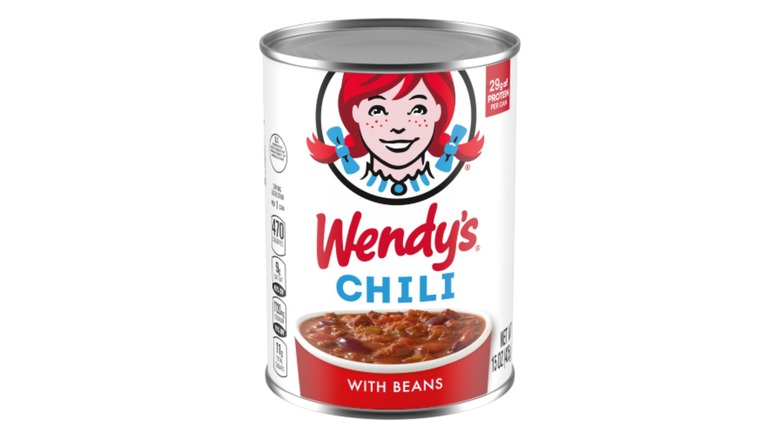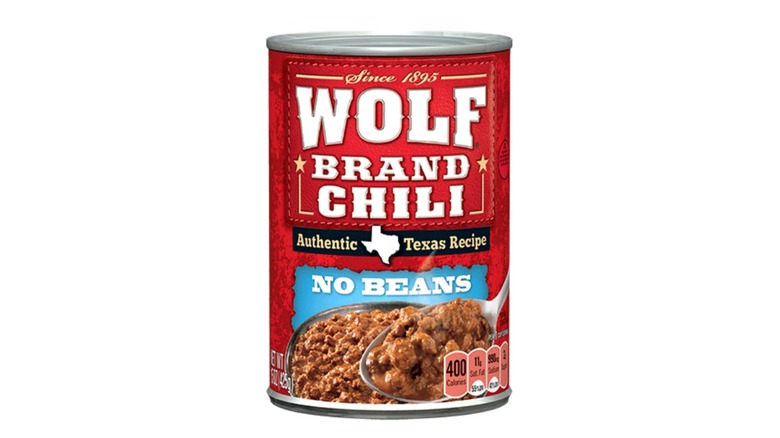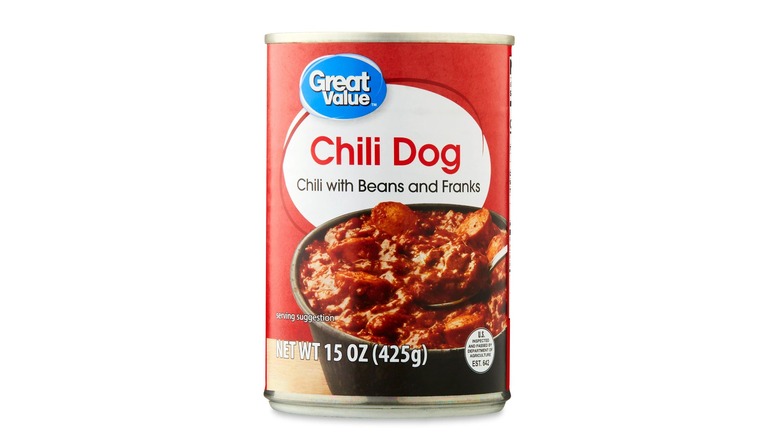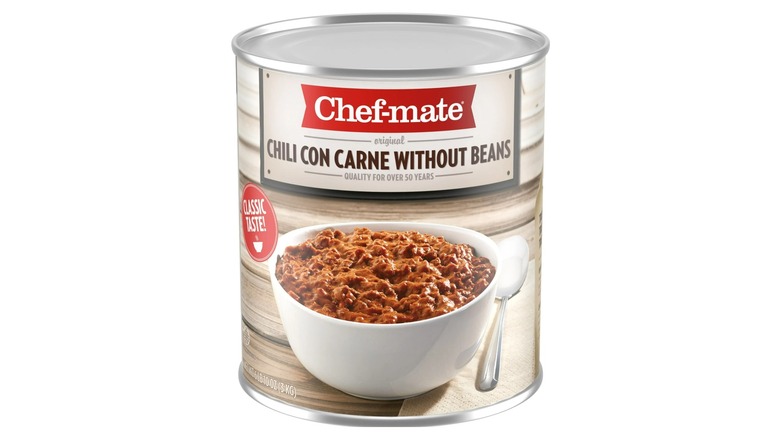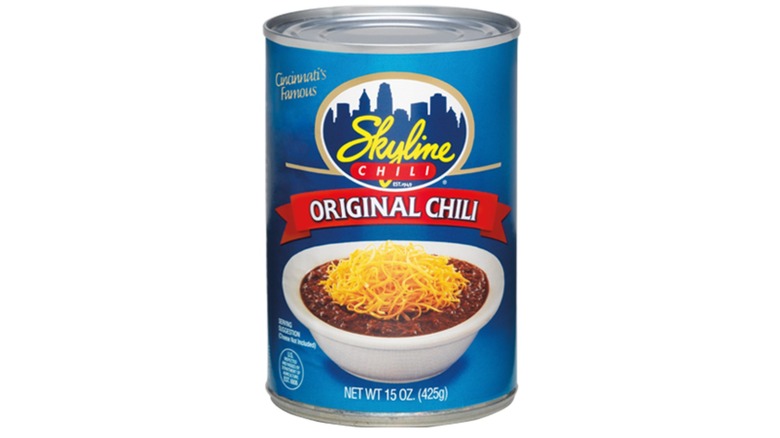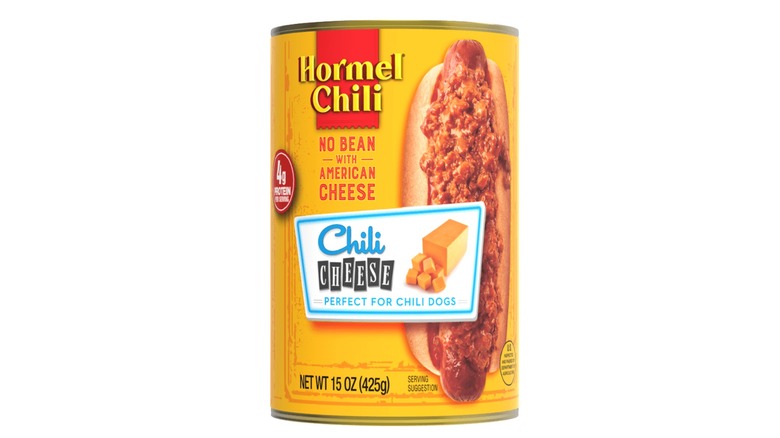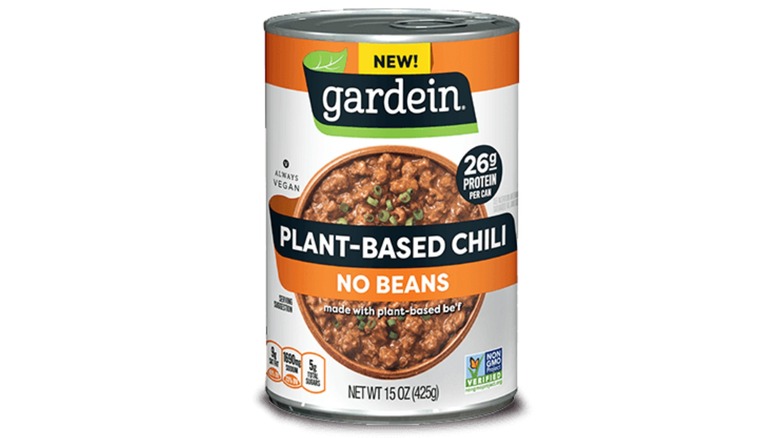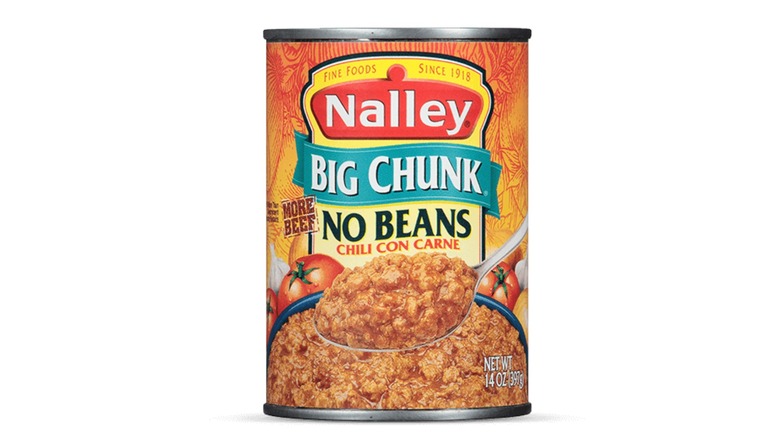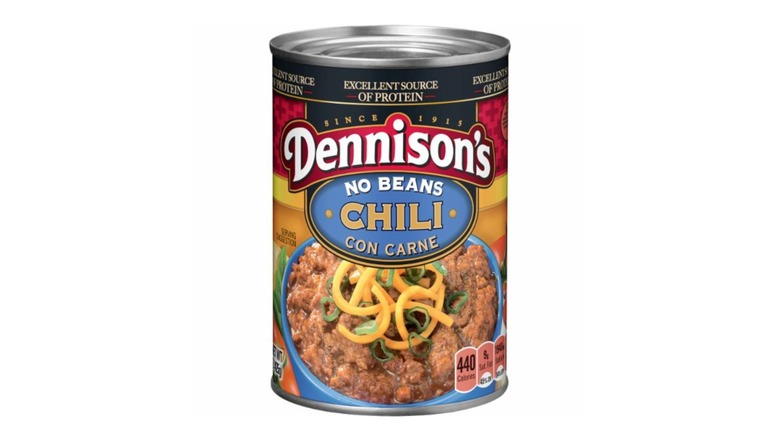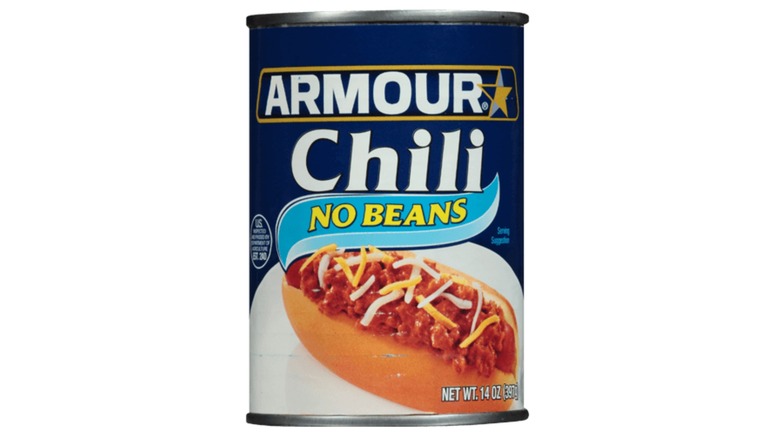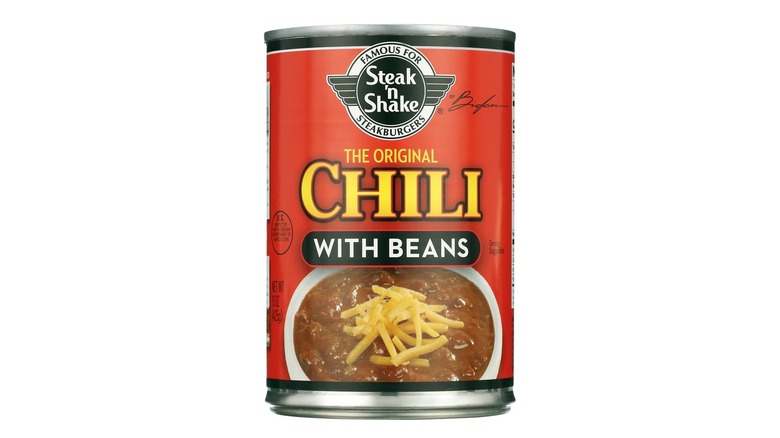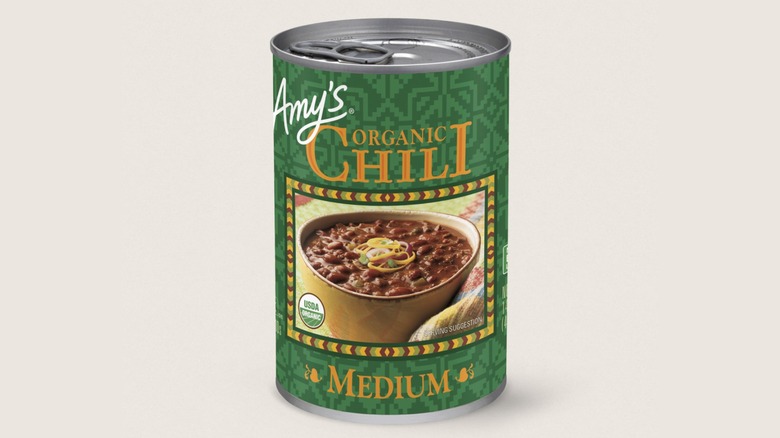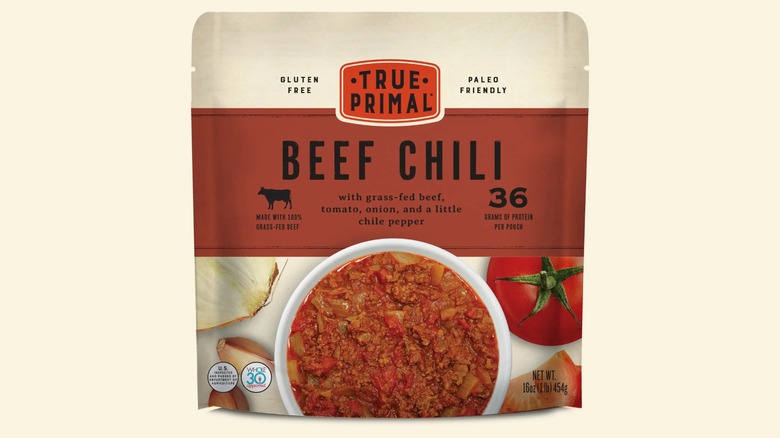The Unhealthiest Store-Bought Chili You Can Buy
Browsing grocery store aisles, there are many types of canned and packaged chili to choose from, all offering a quick, cheap, and hearty meal. The dish typically consists of beef, peppers, and spices, though many recipes incorporate tomatoes, beans, turkey, pork, and other vegetables. While its origins are disputed, chili's popularity in the U.S. is undeniable. Fiercely competitive chili cook-offs are held across the country, a testament to the dish's widespread appeal as well as its ability to bring people together.
But if we're being honest, whipping up chili from scratch isn't always an option 一 not everyone has the time and patience. Sometimes, you just can't beat the convenience of a pre-made meal, especially one as satisfying as chili. However, navigating the overwhelming selection of canned and packaged chilis can be tricky. And if you start looking at the nutrition labels, you'll notice that many packaged chilis are high in sodium and fat.
To help you narrow it down, we've put together a list of the least healthy chili you can find in stores. We examined nutrition labels to determine our list, weighing the good and bad in each contender (but more on this later). With this in mind, you can confidently compare options and choose a packaged chili that fits your dietary needs and preferences.
1. Marie Callender's Angus Beef Chili
Marie Callender's Angus Beef Chili is a nightmare in a can. In one serving (the whole can), you'll end up consuming 2,100 milligrams of sodium, which comes close to the FDA's recommendation of consuming no more than 2,300 milligrams of sodium per day. That's pretty much all your allotted sodium for the day in just one meal. To put things into perspective, the American Heart Association recommends that adults ideally try to consume less than 1,500 milligrams of sodium per day.
When it comes to fat, Marie Callender's Angus Beef Chili packs 12 grams of saturated fat and 2 grams of trans fat. The American Heart Association recommends limiting saturated fat intake to 13 grams per day for anyone on a 2,000-calorie diet. Additionally, it advises restricting your intake of foods that contain trans fat, as it can increase your risk of heart disease, stroke, and type 2 diabetes.
Ingredients-wise, this chili isn't the worst. It features real Angus beef and pinto beans, which offer some fiber. While it does contain modified corn starch and sodium phosphate, these improve and maintain the chili's texture. You can find this chili at Safeway, Walmart, and several other grocery stores across the country.
2. Wendy's Chili With Beans
Unsurprisingly, Wendy's version of chili doesn't score many points health-wise. Available at grocery stores and retailers nationwide, this canned chili is made with beef, pinto beans, and kidney beans. While it does boast some vegetables like celery and bell peppers, it also contains an array of flavorings and other additives. Notably, you'll be ingesting flavor enhancers such as disodium guanylate, which some people may be sensitive to. Also, if added sugar is something you're watching, you'll want to avoid this one.
The nail in the coffin for this chili is its sodium content. One serving contains 1,730 milligrams 一 75% of the daily value for sodium. According to the Centers for Disease Control and Prevention (CDC), excessive sodium consumption can increase blood pressure. This can put you at a greater risk for heart disease and stroke, which are the top causes of death for Americans every year.
While this is a lot of sodium to eat in one sitting, make sure to also take into account the fat content. With 9 grams of saturated fat, Wendy's chili wouldn't be considered the healthiest option. However, it does offer a decent amount of protein and fiber, which offsets some of the bad.
3. Wolf Brand Original Chili, No Beans
Wolf Brand Chili is a commonplace find at retailers like Target and Walmart. However, before you pick up the No Beans option, make sure to flip the can and read the label. Per serving (in this case, the whole 15-ounce can), you'll be consuming a whopping 18 grams of saturated fat. That's well over the recommended limit of 13 grams per day (per the American Heart Association). It's also close to the daily limit of 20 grams set by the FDA. Why is this bad? A diet high in saturated fat can contribute to elevated cholesterol levels. This, in turn, increases your risk of developing heart disease.
Although the chili is high in protein, its fiber content is low. You can blame this on the lack of beans, which are typically high in fiber. Instead, beef, pork, tomatoes, and chili peppers are among the main ingredients. Strangely enough, you'll also find whole rolled oats in this list. While not necessarily a bad thing, oats are probably not something you'd expect to see here. They may be used to add texture to the chili, and they also serve as a cost-effective filler.
4. Great Value Chili with Beans and Franks
Great Value is Walmart's own label, selling everything from food to household products. The brand's Chili with Beans and Franks makes this list for its high levels of fat and sodium. One serving contains 10 grams of saturated fat and 910 milligrams of sodium. Here's the kicker 一 yes, these values are high, but this is only for half the can, the size of one serving.
We don't know about you, but a 15-ounce can is equivalent to a full meal for most. If you were to eat the whole thing, you'd be consuming 19 grams of saturated fat. That's 95% of the daily value for the nutrient, per the FDA's guidelines. You'd also be getting most of your daily allotment for sodium, at 1,640 milligrams. For all this, the chili provides zero fiber. And nope, this is not an exaggeration. So what's in this chili, you're wondering? As the name suggests, you'll find beef, pork, and red beans. But there's an additional ingredient worth noting: sodium erythorbate. This common additive in processed foods acts as a color fixative, preserving the appealing pink hue in processed meats. While not dangerous, this additive has no nutritional value.
5. Chef-mate Chili Con Carne Without Beans
Found in major grocery stores nationwide, Chef-mate Chili Con Carne Without Beans comes in a 106-ounce can and contains 12 servings. Looking closer at the label, the ingredients list leaves much to be desired. Rolled oats act as a filler, and instead of hearty vegetables, the chili relies on "textured vegetable protein," a blend of soy flour and caramel color. This certainly doesn't sound appetizing.
If this weren't enough, the chili's fat and sodium content is through the roof. Even if you only ate one serving, the size of a cup, you'd still consume 9 grams of saturated fat and 1,290 milligrams of sodium. If these numbers don't make you pause, consider if someone were to enjoy more than one serving at a time. It's easy to overindulge, especially considering the large can size. Eating two cups, roughly the amount in a regular-sized can, would double your intake to 18 grams of saturated fat and a significant 2,580 milligrams of sodium, exceeding the FDA's daily recommendation. In short, Chef-mate Chili Con Carne is a handy option for feeding a crowd, but keep an eye on the portion sizes.
6. Skyline Original Chili
While some may know Skyline Chili as a chain of restaurants, more are likely familiar with its line of canned goods. You can find the Cincinnati-style chili at Kroger, Walmart, Meijer, or other retail chains. Unfortunately, the brand's signature Original Chili delivers in the worst ways possible. One serving, equal to about half of a 15-ounce can, contains 1,060 milligrams of sodium and 6 grams of saturated fat. While these numbers don't seem that bad, keep in mind that this is only for one cup of chili.
If you were to eat the whole can (as many of us are likely to do), you'd instead be consuming 10 grams of saturated fat. But this pales in comparison to how much sodium you'd be getting: a remarkable 1,830 milligrams. In other words, there goes 80% of your daily allotment of sodium. On the plus side, you'll at least gain 40 grams of protein with every can. Thankfully, the list of ingredients for this chili is relatively short, featuring beef and tomato sauce as its base.
7. Hormel Chili, No Beans With American Cheese
You've likely seen Hormel's various packaged goods lining your grocery store's shelves. The brand's cheesy chili, labeled as No Beans With American Cheese, can be found at many Walmart and Safeway locations. But be sure to take a good look at its nutrition label 一 it lists seven servings in one regular-sized can.
The stats for one serving aren't bad: 2.5 grams of saturated fat and 300 milligrams of sodium. However, unless you're dividing it among the whole family, a typical serving size might be closer to the entire can. While Hormel doesn't provide the nutritional information for the whole can, it would roughly come out to 2,100 milligrams of sodium and 17.5 grams of saturated fat. Compare this to the FDA's recommended daily limits (2,300 milligrams of sodium and 20 grams of saturated fat), and you'll see why this one qualifies.
As expected for a beanless chili, the fiber content is negligible. If the mixture of American cheese and meat doesn't gross you out, then the long list of processed ingredients might. In addition to preservatives, you'll also find the vague term "flavoring," leaving us guessing about what we're actually consuming.
8. Gardein Plant-Based Chili, No Beans
You might reasonably think that a vegetarian version of chili would be healthier than most meat-filled ones. However, meat-free doesn't necessarily mean better for you in this case. Gardein's Plant-Based Chili with No Beans is excessively high in sodium, with 1,690 milligrams per serving. One 15-ounce can of the stuff (the size of one serving) makes up a concerning 73% of the recommended daily value set by the FDA.
Made with a textured soy protein concentrate that mimics beef crumbles, Gardein's chili also contains rolled oats, which can further help with texture. More unsavory ingredients include caramel color and added sugar, which some might want to avoid. While this chili is a good source of protein, it also contains 9 grams of saturated fat. That's close to half the recommended daily intake for saturated fat. Gardein's chilis are available at major grocery stores across the U.S.; for a more balanced choice, look to the "With Beans" version of the chili, which offers more than twice the fiber content and slightly less sodium.
9. Nalley Chili Con Carne, No Beans
With roots in the Pacific Northwest dating back to 1918, today, Nalley is best known for its chili. Nalley's Chili Con Carne without beans can be found at Walmart, Safeway, and other large retailers nationwide. The chili's ingredients include the usual beef and tomato paste, but it also contains a whole host of other, less-expected add-ins. For one, textured vegetable protein appears as a major ingredient. This mix of soy protein and caramel color acts as a filler and source of protein. You'll also find a mix of starches like modified corn starch, corn flour, and wheat flour.
A single 14-ounce can, which offers two servings, contains 1,070 milligrams of sodium per serving. That's 45% of the recommended daily value. Even though it might seem lower than other contenders on this list, be aware that the FDA considers anything exceeding 20% of its daily value to be high. Plus, eating the entire can would set you back roughly 2,140 milligrams of sodium.
Despite being meat-heavy, one serving of the chili provides only 16 grams of protein, which is low compared to similar canned chilis. Similarly, one serving only offers 2 grams of fiber. Given these stats, there are much better canned chili choices out there.
10. Dennison's No Beans Chili Con Carne
Around since 1915, Dennison's is another long-standing American brand. Its No Beans Chili Con Carne features beef, pork, and chili peppers in a standard-sized can. While the ingredient list seems like it should end there, also expect to find modified corn starch, soy protein concentrate, and gum arabic, which acts as a thickening agent.
Now onto the hard facts. Like many other bean-free chilis, this one packs a salty punch. Clocking in at 1,940 milligrams per serving, this chili fulfills 84% of your daily recommended sodium intake, per the FDA's guidelines. Fat content is another concern, with 9 grams of saturated fat 一 nearly half the daily limit. On the bright side, the chili delivers a solid amount of protein, but the fiber content falls flat at just 7 grams. In comparison, the With Beans version of the chili offers roughly double this amount. Dennison's chilis have a presence in major grocery chains across the country, including Safeway and Walmart.
11. Armour Star Chili with No Beans
Armour Star, which traces its history back to 1867, has been a driving force behind the development of processed foods in the U.S. The brand's Chili with No Beans can be spotted on shelves in major grocery stores across the country. One serving of the chili, equal to half the can, has an astonishing 1,170 milligrams of sodium. There goes half of your day's sodium in one swoop. But it gets worse 一 consuming the entire can (it's only 14 ounces, after all) pushes you well over the limit with a staggering 2,340 milligrams.
In return, one serving of Armour Star chili offers a measly 4 grams of fiber. Looking more closely at the ingredient make-up, it's not hard to see why. Without beans, there's not much in the way of good fiber sources. In addition to beef and pork, the chili also contains several food additives and colorings. For example, you'll find flavor enhancers like monosodium glutamate, which some people may be sensitive to. Instead of real pieces of vegetables, the chili instead offers a textured vegetable protein made of soy flour. You won't find any tomatoes in this chili.
12. Steak 'n Shake Chili with Beans
Steak 'n Shake's line of canned chili lets fans enjoy their favorite comfort meal from their own homes. The Chili with Beans is made up of beef, beans, and seasonings, though it also contains additives like caramel color and emulsifiers. It may come as no surprise that Steak 'N Shake's chili is high in fat. Each can, the size of one serving, has 14 grams of saturated fat 一 that's 70% of the recommended daily intake. There are also 2 grams of trans fat per can.
When it comes to sodium, you'll find 1,790 milligrams in each can. This number is 78% of the daily value for sodium, which is excessively high for one meal. For all that, the fiber content is just moderate, despite the beans in the recipe. On the plus side, the chili delivers a good amount of protein per can. Interested shoppers can find Steak 'N Shake's chili at Walmart, Kroger, and other major chains.
13. Amy's Organic Medium Chili
You might think of Amy's as offering healthier options in the packaged food aisle. While some of the California-based brand's products are healthier than the competition, Amy's Organic Medium Chili unfortunately doesn't fit that bill. One regular-sized can contains 1.5 grams of saturated fat, which admittedly is one of the lowest numbers we've seen. This is likely due to the lack of meat in the recipe. The chili instead uses tofu, beans, and real vegetables like bell pepper and jalapeño.
So where does it go wrong? The chili is high in sodium, with 1,230 milligrams per can. That's more than half the recommended daily intake, which is a lot for a single serving. Luckily, Amy's offers a solution in the form of a low-sodium version of the same chili. The Light in Sodium alternative contains 500 milligrams per can, though it does contain slightly more saturated fat. Amy's chilis are widely available nationwide, at both major grocery stores and local markets.
14. True Primal Beef Chili
Departing from the canned varieties, True Primal Beef Chili comes in an easy-to-open pouch. Labeled as gluten-free, paleo, and free of preservatives and artificial flavors, this chili bills itself as a healthier option. When you look at the list of ingredients, most of which are organic, it does seem healthier at first glance. Grass-fed beef, tomatoes, onions, celery, and spices make up this chili. The only ingredient you might not recognize is calcium chloride, an additive that helps food keep its shape.
Here's where it gets concerning, though. A pouch of True Primal Beef Chili, containing 16 ounces, equals one serving size. One pouch contains 15 grams of saturated fat 一 that's 75% of the daily value. This rivals the fat content of many canned chilis. True Primal Beef Chili also has 950 milligrams of sodium, which is on the low end for this list but still high according to the FDA's standards. While you can certainly do worse, it's worth including to point out the importance of checking the labels of all prepared foods, no matter the claims on the packaging. True Primal Beef Chili is sold at local stores and online.
Methodology
There are so many types of chili out there, and many do provide a healthy, balanced meal. However, the chili that made this list contains high amounts of sodium, fat, and sugar without providing enough healthy nutrients in return. When determining our list, we looked at different packaged chili available at grocery stores and retailers nationwide. Closely examining countless nutrition labels, we considered each chili's calorie count and nutrient content, comparing these values to the FDA and American Heart Association's guidelines. We also took into account the presence of unhealthy food additives and preservatives.
